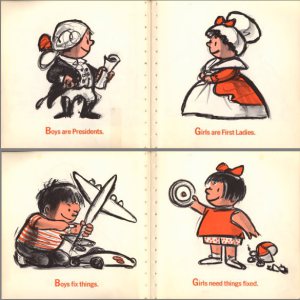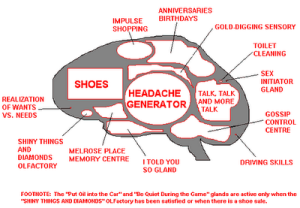I have been unable to avoid thinking about the issue of gender roles in our society and in the church.
A few days ago, a famous pastor posted a facebook status calling people to mock “anatomically effeminate males,” and reactions to this brought up some interesting discussion in the blogging world. “What gives us the right to call a man effeminate?” people wondered. Where do our standards come from?
Inspired by others (especially Tyler L. Clark and Dianna E. Anderson) who were frustrated with the church’s traditional definitions of masculinity and femininity, I began to explore the issue myself.
I began a few discussions on facebook, and wrote a blog post myself, and some good conversation resulted. However, I was left with unanswered questions.

“God, not society, defines gender,” was one criticism I received on Facebook, and several people “liked” it. But this simple answer ignores the fact that the Bible gives no such simple answer. The is no one way given to be masculine and one way given to be feminine.
So, do we follow the example of bold female leaders like Deborah, Esther and Phoebe? Or do we assume that Paul’s advice to the Corinthians about women keeping silent in the church is God’s wish for all women of all time?
Should men be rough and tough war heroes like David or gentle peacemakers like Jesus?
Should the church treat women as property, like Old Testament law did by enforcing a “you break it, you buy it” policy for men who rape virgins? Or should the church treat them as Jesus treated them- as friends and as people?
Should men be the leaders and breadwinners while women stay at home? Or should women follow the example in Proverbs 31 and be the ones providing food for the household?
Some of these questions seem to have more obvious answers then others. But all of these questions are based on Biblical accounts. Which accounts should bring us to our conclusions about gender roles (as Rachel Held Evans points out, we ALL pick and choose when it comes to the Bible. It’s not about whether we pick or choose. It’s about what we pick and choose)?
I’m sure God does define gender. But I think the diverse accounts in the Bible make it clear that gender does not place a person in one of two boxes.
“People are too complex to generalize,” said one friend of mine. I couldn’t agree more.
Humans aren’t commodities.
There isn’t a man factory and a woman factory in heaven. We don’t come off of one of two assembly lines. We were created, not manufactured.

I am a woman. But that doesn’t put me in a box with all the other women in the world. My womanhood doesn’t require me to have specific character traits, abilities, or desires.
I am happy to accept my femaleness as part of my identity. But I will not let my femaleness detract from the other details that God has painted me with.
I am a work of art. And God is no minimalist. My femaleness is just one brush stroke of who I am.
What about you, readers? Do you ever feel like a single aspect of the work of art that is you gets more attention than it deserves? Perhaps you share my frustration with gender roles. Perhaps a physical or mental “handicap” prevents people from seeing the other details that God has given you. Perhaps people attempt to limit you based on your race, social status, or orientation. I’d love to hear your stories and thoughts!















